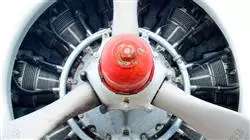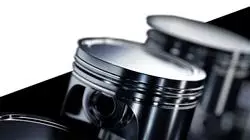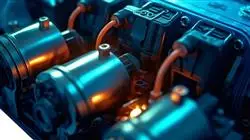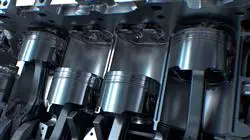University certificate
The world's largest faculty of engineering”
Why study at TECH?
A Postgraduate diploma 100% online that will allow you to implement maintenance and repairs to AICE with efficiency and low environmental impact"

The indiscriminate use of fuel is one of the problems that has historically affected the image of Internal Combustion Engines. For this reason, the search for alternative models has been prioritized in recent times, giving rise to important electronic innovations that allow greater energy efficiency, reduce polluting emissions and enhance the durability of the machinery. With constant technological advances in the industry, understanding and mastering these topics is essential to maintain and improve engine performance, reduce operating costs, comply with regulations and ensure quality operations.
Faced with this scenario, TECH offers a 6-month program where professionals will broaden their competencies in a comprehensive manner. The Postgraduate diploma consists of 3 educational modules and, in each one of them, the students will have within their reach the keys related to the efficiency, reliability, and safety of the Alternative Internal Combustion Engines.
First, the syllabus focuses on fuel injection and engine ignition systems. In addition, it addresses the main high pressure technologies, mixture formation and the instruments for the control and calibration of competent technicians. In turn, it analyzes the sources of vibration, sway and noise, while examining ways to reduce these anomalies. Finally, the plan addresses the most advanced maintenance types and imaging tests for data extraction and long-term damage prevention.
These study materials will be available in an attractive virtual campus with multiple educational and multimedia resources, including explanatory videos, interactive summaries, and complementary readings. All this through the Relearning methodology that facilitates the assimilation of concepts in a fast and flexible way by means of their gradual and continuous repetition. Furthermore, this teaching process will be guided by a faculty of the highest prestige, with a very high level of experience in this sector of engineering.
Enroll in this program and you will have at your disposal the best educational material through videos, infographics and interactive summaries”
This Postgraduate diploma in Maintenance of Alternative Internal Combustion Engines contains the most complete and up-to-date program on the market. The most important features include:
- The development of practical cases presented by experts in Aeronautical Engineering
- The graphic, schematic, and practical contents with which they are created, provide scientific and practical information on the disciplines that are essential for professional practice
- Practical exercises where the self-assessment process can be carried out to improve learning
- Its special emphasis on innovative methodologies
- Theoretical lessons, questions to the expert, debate forums on controversial topics, and individual reflection assignments
- Content that is accessible from any fixed or portable device with an Internet connection
You will have access to the contents of this Postgraduate diploma 24 hours a day, 7 days a week, from the location of your choice”
The program includes in its teaching staff professionals from the sector who bring to this training the experience of their work, as well as recognized specialists from leading companies and prestigious universities.
The multimedia content, developed with the latest educational technology, will provide the professional with situated and contextual learning, i.e., a simulated environment that will provide immersive education programmed to learn in real situations.
This program is designed around Problem-Based Learning, whereby the professional must try to solve the different professional practice situations that arise during the educational year. For this purpose, the students will be assisted by an innovative interactive video system created by renowned and experienced experts.
You are one step away from enrolling in the world's top-rated university by its students according to the Trustpilot platform"

You will delve into the innovative electronic injection systems that ensure precise fuel quantity input in modern engines"
Syllabus
In this study plan, the students will delve into essential elements for the preventive maintenance and recovery of parts and components of reciprocating Internal Combustion Engines. In particular, the syllabus covers, first of all, the types of injection systems, high-pressure technologies, ignition, diagnostics, control, calibration and optimization. Next, the means of inspection and steps for monitoring these machines are discussed. These contents are taught 100% online, accompanied by multimedia resources such as explanatory videos and interactive summaries.

Do you need a methodology that allows you to assimilate complex concepts with flexibility? Achieve your goals with the unique Relearning system"
Module 1. Injection and ignition systems
1.1. Fuel Injection
1.1.1. Mixing Formation
1.1.2. Combustion Chamber Types
1.1.3. Mixture Distribution
1.1.4. Injection Parameters
1.2. Direct and Indirect Injection Systems
1.2.1. Direct and Indirect Injection in Diesel Engines
1.2.2. Injector Pump System
1.2.3. Operation of a Diesel Injection System: Common Rail System
1.3. High Pressure Injection Technologies
1.3.1. In-Line Injection Pump Systems
1.3.2. Rotary Injection Pump Systems
1.3.3. Systems with Single Injection Pumps
1.3.4. Common-Rail Injection Systems
1.4. Mixture Formation
1.4.1. Internal Flow in Diesel Injection Nozzles
1.4.2. Jet Description
1.4.3. Atomization Process
1.4.4. Diesel Jet under Evaporative Conditions
1.5. Control and Calibration of Injection Systems
1.5.1. Components and Sensors in Injection Systems
1.5.2. Engine Maps
1.5.3. Motor Calibration
1.6. Spark Ignition Technologies
1.6.1. Conventional Ignition (Spark Plugs)
1.6.2. Electronic Ignition
1.6.3. Adaptive Ignition
1.7. Electronic Ignition Systems
1.7.1. Operation
1.7.2. Ignition Systems
1.7.3. Spark Plugs
1.8. Diagnosis and Troubleshooting of Injection and Ignition Systems
1.8.1. Motor-Installation Parameters
1.8.2. Thermodynamic Models
1.8.3. Sensitivity of Combustion Diagnostics
1.9. Optimization of Injection and Ignition systems
1.9.1. Engine Map Design
1.9.2. Engine Modeling
1.9.3. Engine Map Optimization
1.10. Engine Map Analysis
1.10.1. Torque and Power Map
1.10.2. Engine Efficiency
1.10.3. Fuel Consumption
Module 2. Vibration, Noise and Engine Balancing
2.1. Vibration and Noise on Internal Combustion Engines
2.1.1. Evolution of Vibration and Noise Motors
2.1.2. Vibration and Noise Parameters
2.1.3. Data Acquisition and Interpretation
2.2. Sources of Vibration and Noise in Engines
2.2.1. Vibration and Noise Generated by the Block
2.2.2. Intake and Exhaust Generated Vibration and Noise
2.2.3. Vibration and Noise Generated by Combustion
2.3. Modal Analysis and Dynamic Response of Motors
2.3.1. Modal Analysis: Geometry, Materials and Configuration
2.3.2. Modal Analysis Modeling: One Degree of Freedom/Multiple Degrees of Freedom
2.3.3. Parameters: Frequency, Damping and Vibration Modes
2.4. Frequency and Torsional Vibration Analysis
2.4.1. Amplitude and Frequency of Torsional Vibration
2.4.2. Vibration Frequencies of Internal Combustion Engines
2.4.3. Sensors and Data Acquisition
2.4.4. Theoretical vs. Experimental Analysis
2.5. Engine Balancing Techniques
2.5.1. In-Line Distribution Engine Balancing
2.5.2. V-Distribution Engine Balancing
2.5.3. Modeling and Balancing
2.6. Vibration Control and Reduction
2.6.1. Control of Natural Vibration Frequencies
2.6.2. Vibration and Shock Isolation
2.6.3. Dynamic Damping
2.7. Noise Control and Reduction
2.7.1. Noise Control and Attenuation Methods
2.7.2. Exhaust Silencers
2.7.3. Active Noise Cancellation Systems ANCS
2.8. Vibration and Noise Maintenance
2.8.1. Lubrication
2.8.2. Engine Block Balancing
2.8.3. Useful Life of the Systems Dynamic Fatigue
2.9. Impact of Engine Vibration and Noise on Industry and Transportation
2.9.1. International Standards in Industrial Plants
2.9.2. International Regulations Applicable to Land Transportation
2.9.3. International Regulations Applicable to Other Sectors
2.10. Practical Application of Vibration and Noise Analysis of an Internal Combustion Engine
2.10.1. Theoretical Modal Analysis of an Internal Combustion Engine
2.10.2. Determination of Sensors for Practical Analysis
2.10.3. Establishment of Suitable Attenuation Methods and Maintenance Plan
Module 3. Diagnosis and Maintenance of Alternate Internal Combustion Engines
3.1. Diagnostic Methods and Failure Analysis
3.1.1. Identification and Use of Different Diagnostic Methods
3.1.2. Failure Code Analysis and OBD Diagnostics Systems
3.1.3. Use of Advanced Diagnostic Tools
3.1.3.1. Scanners and Oscilloscopes
3.1.4. Interpretation of Data to Identify Problems and Improve Performance
3.2. Maintenance Types
3.2.1. Differentiation between Preventive, Predictive and Corrective Maintenance
3.2.2. Selecting the Appropriate Maintenance Strategy According to the Context
3.2.3. Planned Maintenance to Minimize Costs and Downtime
3.2.4. Focus on Extended Engine Life and Optimal Engine Performance
3.3. Repair and Adjustment of Components
3.3.1. Repair and Adjustment Techniques for Key Components
3.3.1.1. Injectors, Spark Plugs and Timing Systems
3.3.2. Identification and Troubleshooting of Ignition and Combustion Related Problems
3.3.3. Fine-Tuning to Optimize Performance and Efficiency
3.4. Performance and Fuel Economy Optimization
3.4.1. Strategies for Improving Fuel Efficiency and Engine Performance
3.4.2. Adjustment of Injection and Ignition Parameters to Maximize Fuel Economy
3.4.3. Evaluation of the Relationship between Performance and Emissions to Comply with International Environmental Regulations
3.5. Failure Analysis and Troubleshooting
3.5.1. Systematic Processes for Identifying and Resolving Engine Failures
3.5.2. Use of Flowcharts and Diagnostic Checklists
3.5.3. Testing and Analysis to Isolate Specific Problems in Components
3.6. Data Management and Engine Performance Logging
3.6.1. Engine Performance Data Collection and Analysis
3.6.2. Use of Logs to Monitor Trends and Anticipate Problems
3.6.3. Implementation of Recording Systems to Improve Traceability and Preventive Maintenance
3.7. Motor Inspection and Monitoring Techniques
3.7.1. Visual and Auditory Inspection of Components for Wear and Damage
3.7.2. Vibration and Abnormal Noise Monitoring as Indicators of Problems
3.7.3. Use of Sensors and Real-Time Monitoring Systems for Detecting Subtle Changes
3.8. Diagnostic Imaging and Non-Destructive Testing
3.8.1. Application of Imaging Techniques to Tetect Problems
3.8.1.1. Thermography, Ultrasound
3.8.2. Non-Destructive Testing for Early Defect Detection
3.8.3. Interpretation of Imaging Test Results for Maintenance Decisions
3.9. Planning and Execution of Maintenance Programs
3.9.1. Design of Customized Maintenance Programs for Different Engines Applications
3.9.2. Scheduling of Maintenance Intervals and Activities
3.9.3. Coordination of Resources and Teams for Efficient Program Execution
3.10. Best Practices in Engine Maintenance
3.10.1. Integration of Techniques and Approaches to Achieve Optimal Results
3.10.2. International Safety and Regulatory Compliance During Maintenance
3.10.3. Encouraging a Culture of Continuous Improvement in Engine Maintenance

TECH is the best digital university in the world according to Forbes magazine. Don't miss the opportunity to be part of their academic community”
Postgraduate Diploma in Maintenance of Alternative Internal Combustion Engines
Prepare yourself for a transformation in your engineering career with the Postgraduate Diploma in Alternative Internal Combustion Engine Maintenance offered by TECH Global University. This elite program will immerse you in the exciting world of engine engineering and provide you with the skills necessary to excel in alternative internal combustion engine maintenance. Our priority is to provide you with an exceptional educational experience through world-class online classes. At TECH, we understand the importance of flexibility in higher education, which is why we have designed this graduate degree so that you can access online classes from anywhere and at any time that is convenient for you. This allows you to advance your career without compromising your work or personal responsibilities. The Postgraduate Diploma program covers a wide range of critical topics, including engine mechanics, troubleshooting, repair and preventive maintenance. Our focus is on providing you with the practical skills and technical knowledge necessary to meet real-world challenges in the field of engine engineering.
The program is designed to provide you with the practical skills and technical knowledge necessary to meet real-world challenges in the field of engine engineering.
Title yourself online at the best College of Engineering
At TECH Global University we work with industry experts and experienced professionals who will guide you through your program, providing you with up-to-date knowledge and best practices. You'll develop the confidence and skill to tackle complex problems in reciprocating internal combustion engines, making you an invaluable asset in your field. The Postgraduate Diploma in Alternative Internal Combustion Engine Maintenance will give you a competitive edge in the engineering job market. Prepare yourself for a successful and challenging career in the exciting world of engine technology - don't miss this opportunity to boost your professional future! Join TECH Global University and begin your journey to success in alternative internal combustion engine engineering today.







